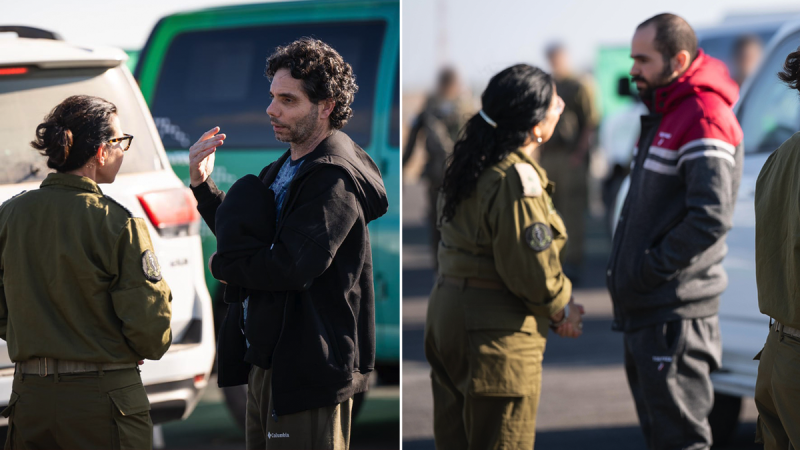Terror group Hamas on Saturday released three more hostages, an American-Israeli citizen Keith Siegel, as part of the ceasefire agreement with Israel.
Hamas first handed over Ofer Kalderon and Yarden Bibas to the Red Cross, and both were later given over to IDF soldiers.
‘Ofer is home! We are overwhelmed with joy, relief, and emotion after 484 long and difficult days of unbearable waiting,’ Kalderon’s family said in a statement.
The family added that a ‘challenging rehabilitation period lies ahead, but we know that with our combined strength, abundant love, and a united, supportive family, we will do everything necessary to help him stand on his feet again.’
Siegel, 65, was released later in the day. He was raised in North Carolina and immigrated to Israel as a young man, becoming a dual U.S.-Israeli citizen. He and his wife, Aviva, settled in Kibbutz Kfar Aza. He had been held in Gaza since October 7, 2023, when both were kidnapped from their home during the Hamas massacre.
Aviva Siegel, who was freed in the last hostage deal in November, previously told Fox News about her fears for his deteriorating health, emphasizing that the fight is not over until all hostages return. Alongside Siegel, French-Israeli Ofer Kalderon and Yarden Bibas were also freed. Bibas’ wife and two young children remain in captivity.
Siegel would be the first American freed under the current ceasefire deal. So far, 10 Israeli hostages and five Thai nationals abducted on October 7 have also been released. Six Americans remain in Gaza. Among them, Sagui Dekel-Chen, a 36-year-old father of three, is expected to be freed soon. Another captive, Edan Alexander, 21, from New Jersey, was serving in the IDF when taken. Hamas also holds the bodies of deceased hostages.
Securing the release of U.S. citizens and other hostages remains a top priority for President Donald Trump, who warned Hamas would face ‘all hell to pay’ if they failed to comply. White House envoy Steve Witkoff, closely monitoring the situation, recently became the first U.S. official to visit Gaza in 15 years. ‘There is almost nothing left of Gaza,’ Witkoff told Axios, estimating that full reconstruction could take 10 to 15 years. He stressed that advancing the hostage deal is key to stabilizing the region and broader diplomatic efforts, including Saudi-Israeli normalization talks.
For the families of those still in captivity, the struggle is far from over. Yechi Yehoud, father of released hostage Arbel Yehoud who was released on Thursday, delivered an emotional statement upon his daughter’s return.
‘Arbel has come back to us in reasonable health, considering the hell she endured. She survived heroically until the very end, displaying immeasurable courage. We are here also to express our gratitude to President Trump, and his Middle East Special Envoy Mr. Steve Witkoff, who knew how to speak ‘Trump language’ in the Middle East and leverage full diplomatic pressure for the hostages’ return… We won’t rest until we know they’re back with us, alive!’
The ceasefire, which has temporarily halted a brutal 15-month war, is unfolding in phases. Each stage involves the staggered release of Israeli hostages in exchange for Palestinian prisoners and increased humanitarian aid into Gaza. However, the process has faced setbacks, including horrific scenes this week when Hamas paraded hostages before an angry mob, endangering their safety. The chaotic handover to the Red Cross sparked outrage in Israel. Prime Minister Benjamin Netanyahu briefly halted the reciprocal release of Palestinian prisoners, warning Hamas against further disruptions.
The current plan includes additional hostage releases in the coming weeks, with 33 captives expected to be freed over six weeks. In return, Israel will release 2,000 Palestinian security prisoners, including 250-300 convicted of deadly attacks, and allow increased humanitarian aid into Gaza. Whether Hamas will fully comply remains uncertain, putting the fragile truce at risk.
Amid high-stakes ceasefire negotiations, Netanyahu has accepted an invitation from President Trump to visit Washington on February 4, making him the first foreign leader to meet Trump in his second term. The visit will focus on the hostage deal, ceasefire discussions, and broader security concerns, including Iran and Gaza’s reconstruction.

